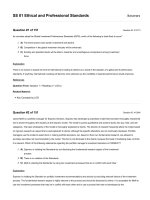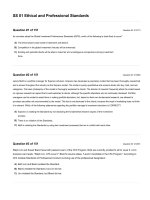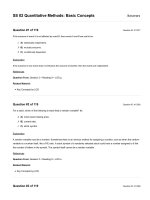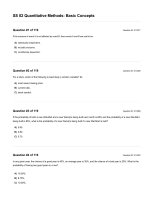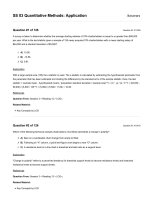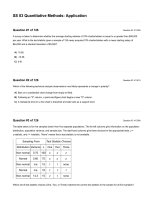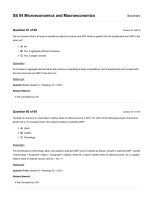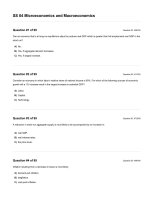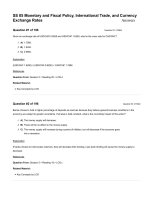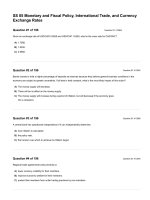CFA 2019 level 1 schwesernotes book quiz bank SS 01 quiz 1
Bạn đang xem bản rút gọn của tài liệu. Xem và tải ngay bản đầy đủ của tài liệu tại đây (581.52 KB, 47 trang )
SS 01 Ethical and Professional Standards
Question #1 of 151
Question ID: 412713
As countries adopt the Global Investment Performance Standards (GIPS), which of the following is least likely to occur?
A) The trend toward cross border investments will decline.
B) Competition in the global investment industry will be enhanced.
C) Existing and potential clients will be able to make fair and unambiguous comparisons among investment
firms.
Question #2 of 151
Question ID: 412664
Janice Melfi is a portfolio manager for Soprano Advisors. Soprano has developed a proprietary model that has been thoroughly researched
and is known throughout the industry as the Soprano model. The model is purely quantitative and screens stocks into buy, hold, and sell
categories. The basic philosophy of the model is thoroughly explained to clients. The director of research frequently alters the model based
on rigorous research-an aspect that is well explained to clients, although the specific alterations are not continually disclosed. Portfolio
managers use the model to assist them in making portfolio decisions, but, based on their own fundamental research, are allowed to
purchase securities not recommended by the model. This fact is not disclosed to the clients, because the head of marketing does not think
it is relevant. Which of the following statements regarding the portfolio manager's investment decisions is CORRECT?
A) Soprano is violating the Standards by not disclosing the fundamental research aspect of the investment
process.
B) There is no violation of the Standards.
C) Melfi is violating the Standards by using two investment processes that are in conflict with each other.
Question #3 of 151
Question ID: 412631
Ralph Lim and Susan Bland have both passed Level I of the CFA Program. Both are currently enrolled to sit for Level II. Lim's
business card reads, "Ralph Lim, CFA Level I." Bland's resume states, "Level II Candidate in the CFA Program." According to
CFA Institute Standards of Professional Conduct involving use of the professional designation:
A) Both Lim and Bland violated the Standard.
B) Bland violated the Standard, but Lim did not.
C) Lim violated the Standard, but Bland did not.
Question #4 of 151
Question ID: 412662
Dan Jeffries is a portfolio manager who is being sued by one of his clients for inappropriate investment advice. The Professional Conduct
Program of CFA Institute is investigating Jeffries for the same offense. Jeffries settles the lawsuit with the client while the Professional
Conduct Program investigation is ongoing. When the Professional Conduct Program staff questions Jeffries about the problematic
investment advice, Jeffries claims he cannot talk about it because doing so would violate the confidentiality of his client. Jeffries has:
A) violated the Standards by refusing to talk about the case with the Professional Conduct Program, but not by
executing the settlement agreement.
B) not violated the Standards by executing the settlement agreement or by refusing to talk about the case with
the Professional Conduct Program.
C) violated the Standards by executing the settlement agreement, but not by refusing to talk about the case
with the Professional Conduct Program.
Question #5 of 151
Question ID: 412731
When verifying a firm's compliance with Global Performance Investment Standards (GIPS), the verifier must:
A) attest that the firm's processes and procedures are established to present performance in
accordance with GIPS requirements.
B) disclose whether the verification was performed by the firm's internal auditors or a third party.
C) clearly identify the composites for which verification has been performed.
Question #6 of 151
Question ID: 412748
All of the following are titles of one of the nine sections of the Global Investment Performance Standards (GIPS) EXCEPT:
A) Implementation.
B) Input Data.
C) Real Estate.
Question #7 of 151
Question ID: 454932
Stephanie Orange, Level II CFA candidate, posts blogs for her exam study group three days after the exam to vent her
frustrations over the exam. However, to avoid disclosing what was actually on the exam, she only discusses topic areas she
thought would be on the exam that were not. She writes "...the topics selected were unnecessarily obscure. Important items like
FCF, DDM, and Residual Income were ignored completely..." Orange is most likely:
A) in violation of Standard VII(A) "the Code and Standards" for providing confidential information about
the exam.
B) not in violation because the information about the actual exam contents was posted only after the
conclusion of the exam.
C) not in violation because the information was only about what was not on the exam.
Question #8 of 151
Question ID: 412683
Which of the following statements about a member's use of client brokerage commissions is NOT correct? Client brokerage commissions:
A) should be commensurate with the value of the brokerage and research services received.
B) should be used by the member to ensure that fairness to the client is maintained.
C) may be directed to pay for the investment manager's operating expenses.
Question #9 of 151
Question ID: 412633
Which of the following is least likely an appropriate use of the CFA designation?
A) Jeremy Salyers, CFA.
B) Jeremy Salyers has earned the CFA designation by passing three exams, all three on his first
attempts.
C) Jeremy Salyers, as a CFA charterholder, expects to outperform the market because CFA
charterholders have on average outperformed their peers.
Question #10 of 151
Question ID: 412659
Scott Marsh is a research analyst for a brokerage firm following the computer industry. Joe Perry is Marsh's former college
roommate and is the head of technology for Mercury, a large software company. Perry informs Marsh on Tuesday that in two
days the company will be making an official announcement that its release of its newest version of its software will be moved up
one month, from October 1 to September 1. The announcement will be surprising to the industry and will likely be met with
skepticism because the company has had trouble meeting release dates in the past. Perry assures Marsh that he is certain that
they will meet the September 1 date. Marsh considers Perry to be very honest and highly competent. Marsh should:
A) produce his research report in two days based solely on the official announcement, not taking into
consideration the information from Perry.
B) immediately put out a report recommending the stock, but waiting until the official announcement to
state his reasons.
C) wait until the public announcement is made, then release a report explaining that he believes the
company will make the release date, disclosing that one of the reasons for his opinion is Perry is a
friend of his.
Question #11 of 151
Question ID: 412656
Ned Brenan manages two dozen pension accounts, one of which earned over 25% during the past two years. Brenan tells
prospective clients that based on past experience they can expect a 25% return on their funds. Which of the following statements
is CORRECT?
A) Brenan has violated Standard of Professional Conduct III(D), Performance Presentation, but Brenan
has not violated Standard I(C), Misrepresentation.
B) Brenan has not violated Standard of Professional Conduct III(D), Performance Presentation, but
Brenan has violated Standard I(C), Misrepresentation.
C) Brenan has violated both Standard of Professional Conduct III(D), Performance Presentation, and
Standard I(C), Misrepresentation.
Question #12 of 151
Question ID: 412646
Chuck Daniels has just been hired to manage a security analysis group for Aaron Asset Management. Daniels performed a similar function
at another firm and finds the compliance system at Aaron inadequate. He develops a system that he feels is appropriate, but senior
management tells him he will have to wait six months to implement the system. Daniels should:
A) protest in writing the delay, listing the potential dangers that can occur.
B) resign his position immediately.
C) decline in writing to accept supervisory responsibility until a satisfactory compliance system is put into place.
Question #13 of 151
Question ID: 412617
Nichole Zeller and Randy Toffler have both passed Level II of the CFA Exam Program and have registered for Level III. Zeller
circulates a resume stating that she is a candidate for the CFA designation and has passed Level II of the CFA program. Toffler
circulates a resume stating that he is a CFA II. Which of the following statements is CORRECT?
A) Only Toffler has violated the Code of Standards.
B) Both Zeller and Toffler have violated the Code of Standards.
C) Only Zeller has violated the Code of Standards.
Question #14 of 151
Question ID: 412715
In 1995, the CFA Institute sponsored and funded the Global Investment Performance Standards (GIPS) in response to:
A) a need to address issues, such as portability of investment results.
B) an increase in insider trading.
C) both of the reasons listed here.
Question #15 of 151
Question ID: 412645
Brenda Clark is an investment advisor. Two years ago Clark decided to stop calculating a return composite because of the time required to
make those calculations. A prospective client asks Clark what she thinks her performance would have been over the past two years. Clark:
A) cannot answer the question, nor can she discuss potential future market returns with the prospective client.
B) cannot answer the question because it would be misleading.
C) can answer the question orally but cannot state the numbers in writing.
Question #16 of 151
Question ID: 412649
Denise Weaver is a portfolio manager who manages a mutual fund and has pension clients. When Weaver receives a proxy for
stock in the mutual fund, she gives it to Susan Griffith, her administrative assistant, to complete. When the proxy is for a stock
owned in a pension plan, she asks Griffith to send the proxy on to the sponsor of the pension fund. Weaver has:
A) violated the Standards by her policy on mutual fund and pension fund proxies.
B) not violated the Standards.
C) violated the Standards by her policy on mutual fund proxies, but not her policy on pension fund
proxies.
Question #17 of 151
Question ID: 485751
Jean Davis and Brian Taylor were recently hired by a local brokerage. Davis is registered for the Level II CFA exam and does not
reference the CFA designation on her business card. In her marketing materials, Davis factually describes CFA requirements and
notes that she expects to pass in June. Taylor passed the Level II exam and has not yet registered for the Level III CFA exam.
Taylor also does not reference the CFA designation on his card and writes in his marketing materials that he passed both Levels I
and II of the CFA exam on his first try, which is true. Have Davis or Taylor violated any CFA Institute Standards of Professional
Conduct?
A) Only one violated the Standards.
B) Neither violated the Standards.
C) Both violated the Standards.
Question #18 of 151
Question ID: 412635
After a very successful quarter of high investment returns, Judy O'Berry, CFA, receives several gifts from grateful clients. O'Berry
considers the gifts to be of novelty or sentimental value only, but she hears rumors that several junior employees are jealous of
the attention she received for the group's efforts. She decides to consult the company's compliance rules on gifts and is surprised
to learn her firm has no established rules. She consults the Standards of Practice Handbook, and then submits proposed rules on
gifts to her company's compliance department. These rules should contain all of the following EXCEPT:
A) a formal value limit based on local customs.
B) restrictions on all types business entertainment.
C) a requirement to disclose the gift.
Question #19 of 151
Question ID: 412717
Which of the following best describes the underlying principles upon which the Global Investment Performance Standards (GIPS)
are based?
A) Fair and consistent application of a global set of regulatory requirements.
B) Uniformity and consistent application of standards for the global regulation of the securities industry.
C) Full disclosure and fair representation of performance results.
Question #20 of 151
Question ID: 412699
Brendan Duval works as a research analyst for Toby Securities. Duval recommends changing a recommendation from "sell" to
"buy" on Dalton Company. His firm, which manages several mutual funds, may be interested in buying Dalton's stock. He also
manages the retirement account that his parents established with Toby. Duval wants to buy shares of Dalton's stock because it is
an appropriate investment for his parent's retirement account and obtains approval from his employer to do so. Duval is also
thinking about personally investing in Dalton stock. According to CFA Institute Standards of Professional Conduct, which of the
following best describes the priority of transactions? Duval should give:
A) priority to Toby's clients and his employer concurrently, followed by his parent's retirement account,
and finally his personal account.
B) Toby's clients and his parent's account equal priority, followed by his employer, and then his personal
account.
C) priority of transactions to Toby's clients, followed by his employer, then his parent's retirement
account, and finally his personal account.
Question #21 of 151
Question ID: 434183
Amanda Brad, CFA, is a security analyst at UpTrend, Inc. During a routine visit to a beauty salon, she learns that a major
cosmetic company, Lorean, is expected to present a revolutionary formula for facial cream. Brad buys Lorean stock for her
portfolio and prepares a special report on the company. Brad also makes a call to Hillary Lang, another security analyst at
UpTrend, to inform her about the news. Lang starts trading on her clients' portfolios. Brad's report states that given the on-going
research activity at Lorean within the last months, investors can expect some successful new products and a sharp increase in
the price of the stock. Lang's actions:
A) violate the Standard of Fair Dealing.
B) violate the Standard of Objectivity and Independence.
C) violate the Standards because she trades on inside information.
Question #22 of 151
Question ID: 412654
Maggie McCarthy is an individual investment advisor who uses mutual funds for her clients. She typically chooses from a list of 40 funds
that she has thoroughly researched. The Figgs, a married couple that are a client, asked her to consider the Boilermaker fund for their
portfolio. McCarthy had not previously considered the fund because when she first conducted her research three years ago, Boilermaker
was too small to be considered. However, the fund has now grown in value, and after doing thorough research on Boilermaker, she found
the fund was by far the most outstanding large company value fund in her list of funds. She puts the fund in the Figgs' portfolio, and in all
new clients portfolios, but not in any of her other clients' portfolios. Her reasoning is that her existing clients were comfortable with their
current holdings, and she did not want to risk disturbing their comfort. Has McCarthy violated any Standards? McCarthy has:
A) violated the Standards by not dealing fairly with clients.
B) violated the Standards by not having a reasonable and adequate basis for making the recommendation.
C) not violated the Standards.
Question #23 of 151
Question ID: 412737
Longhorn Investments prepares its performance presentations in accordance with Global Investment Performance Standards
(GIPS). As part of its employee benefits package, Longhorn does not charge a fee to its employees for managing their portfolios.
When calculating total firm assets for the purpose of GIPS compliance, Longhorn should:
A) only include those employee portfolios that are in discretionary accounts.
B) not include these employee portfolios because they are in non-fee-paying accounts.
C) include these employee portfolios.
Question #24 of 151
Which of the following individuals may refer to himself or herself as a candidate in the CFA Program?
Question ID: 460638
A) Bob Krall passed the Level II exam and intends to register for the next Level III exam.
B) Ed Long has not yet attempted a Level I exam but has registered for the next one.
C) Jane Baker received a passing score in January for the Level I exam but is waiting until the following
year to register for the Level II exam.
Question #25 of 151
Question ID: 702535
Rachel Young, CFA, is making preparations to start a competitive business before terminating her relationship with her employer,
a large money management company. Young asks Dot Wiggins, a colleague, to consider joining her. In subsequent discussions
with Young, Wiggins learns that Young has used excerpts from research reports by others with only a slight change in wording
without acknowledging the source. According to CFA Institute Standards of Professional Conduct, Young has:
A) violated Standard IV(A) Loyalty, because she was making preparations to start a competitive
business before terminating her relationship with her employer.
B) not violated the Standards.
C) violated Standard I(C) Misrepresentation, because she did not acknowledge the source of excepts
that she used in research reports.
Question #26 of 151
Question ID: 412615
Lucy Ackert and Chris Brown prepared the following information to be included in the promotional materials of their employer,
Lofton Securities.
Lucy Ackert is one of five CFAs at Lofton Securities. She satisfied all requirements for the CFA designation in 1998.
Chris Brown holds a CFA Level I designation, which he passed in 2001. He is registered to take the next scheduled Level II
examination.
Are the promotional materials prepared by Ackert and Brown fully consistent with the Standards of Professional Conduct?
A) Ackert: No. Brown: Yes.
B) Ackert: Yes. Brown: No.
C) Ackert: No. Brown: No.
Question #27 of 151
Question ID: 412694
Chuck Thomas is the trustee of a trust of which Jill Wyatt is the main beneficiary. Wyatt's husband is the president of a company.
In emptying the recycling bin at home, Wyatt finds some papers that lead her to believe that her husband's company will make a
tender offer to acquire another firm. Wyatt takes the information to Thomas, who uses it to purchase shares of the company for
the trust, but does not further disclose the information. Thomas has:
A) violated the Standards concerning loyalty, prudence, and care.
B) not violated any Standards.
C) violated the Standards concerning material nonpublic information.
Question #28 of 151
Question ID: 412698
Caroline Turner, an analyst for Lansing Asset Management, just completed an investment report in which she recommends
changing a "buy" to a "sell" for Gallup Company. Her supervisor at Lansing approves of the change in recommendation. Turner
wonders about whether she needs to disseminate this investment recommendation to Lansing's clients and if so, how to
distribute this information. According to CFA Institute Standards of Professional Conduct, Turner is:
A) not required to disseminate the change of recommendation from a buy to a sell because the change
is not material.
B) required to disseminate the change in a prior investment recommendation to all clients and
customers on a uniform basis.
C) required to design an equitable system to disseminate the change in a prior investment
recommendation.
Question #29 of 151
Question ID: 551100
For the past 5 years, Karen Beckworth, CFA, has served as a proctor for the CFA exam. Beckworth tells her assistant, a Level III
CFA candidate, that she normally receives the examinations on the Thursday before the exam. Given the low pass rate at Level
III, Beckworth asks her assistant if he would like an advance copy of the next exam. Beckworth's assistant declines the offer.
Beckworth's assistant has been very vocal about expressing his opinions about the low pass rate. The assistant claims, "there
are too many charterholders and CFA Institute is deliberately failing candidates because the prestige of the CFA charter is
becoming diluted."
With regard to Standard VII(A) Conduct as Participants in CFA Institute Programs, which of the following statements concerning
Beckworth's and her assistant's behavior is most accurate?
A) Neither Beckworth nor her assistant is in violation of Standard VII(A).
B) Both Beckworth and her assistant are in violation of Standard VII(A).
C) Beckworth is in violation of Standard VII(A), but her assistant is not in violation.
Question #30 of 151
Question ID: 412670
Patricia Young is an individual investment advisor who uses a computer model to place each of her clients into an appropriate
portfolio. The model analyzes a range of simulated portfolios and computes for each the probabilities of achieving various levels
of return. Young then selects the portfolio that provides the highest probability of achieving the clients' minimum required return.
By using this process, Young is:
A) violating Standard I(C) - Misrepresentation.
B) violating Standard III(C) - Suitability.
C) not violating the Standards.
Question #31 of 151
Question ID: 412658
While having a conversation with a prospective client, John Henry states that his performance across all of his past clients over
the past five years was over 20%, which was 200 basis points higher than his benchmark. He tells the client that while the
benchmark may rise or fall over time, his excess performance will remain consistent. Henry violated the Standards of
Professional Conduct because:
A) he cannot discuss prospective future performance in any manner.
B) the statement of excess performance is misleading with respect to its certainty.
C) he cannot discuss performance without clearly stating that the composite does not conform to GIPS.
Question #32 of 151
Question ID: 412725
Jones, Inc., is attempting to qualify for Global Investment Performance Standards (GIPS) compliance. Regarding mandatory disclosures,
which of the following disclosures will be insufficient and thus prevent Jones, Inc., from claiming compliance?
A) Jones discloses all non-fee paying portfolios that are included in composites and notes the percentage of
composite assets that are non-fee paying portfolios.
B) Jones discloses all firm assets under active management each period.
C) Jones' definition of the firm is that they are a brokerage/portfolio management firm registered with the
Securities and Exchange Commission (SEC).
Question #33 of 151
Question ID: 412641
Marc Feldman, CFA, is manager of corporate investor relations for a high-tech startup, zippy.com, in Boise, Idaho. Feldman
learns that Larry Smith, controller, is altering the accounting records. Feldman advises some of his personal friends to sell short
zippy.com. This action:
A) constitutes professional misconduct but not the use of nonpublic information and is a violation of the
Code and Standards.
B) constitutes a violation of the Standard concerning prohibition against misrepresentation.
C) constitutes the use of material nonpublic information and is a violation of the Code and Standards.
Question #34 of 151
Question ID: 412680
Randal Brooks is the chief economist for a large brokerage firm. In the aftermath of a national tragedy, Brooks feels that it is very possible
that the stock market will drop significantly and not recover for several years. However, he does not believe that this is the most likely
scenario but merely that the risk of investing in equities has increased. He decides to write a market commentary to the brokerage clients
that discusses the reasons why the market will remain stable and talks about why he, as a private citizen, feels patriotic. He does not
mention the increase risk in equities. Brooks has:
A) violated the Standards by not including all of the relevant factors in the research report and making patriotic
statements.
B) violated the Standards by not including all of the relevant factors in the research report, but not by making
patriotic statements.
C) not violated the Standards.
Question #35 of 151
Question ID: 412752
The provisions for each section of the Global Investment Performance Standards (GIPS) are divided between:
A) minimum standards and recommendations.
B) fee-paying and non fee-paying portfolios.
C) requirements and recommendations.
Question #36 of 151
Question ID: 697259
According to the Global Investment Performance Standards (GIPS), where existing laws or regulations conflict with GIPS, firms:
A) are required to comply with local laws and regulations in preparing a compliant presentation.
B) may choose to comply with either GIPS or local laws and regulations, but must make full disclosure
of the conflict in any compliant presentation.
C) are required to comply with GIPS in preparing a compliant presentation.
Question #37 of 151
Question ID: 412667
Betsy Fox is an investment advisor who has a client, Don Gordon, who is an employment lawyer. At lunch, Fox noticed Gordon
and the Chief Financial Officer of Blue Star Company at the next table. She overhears them talking and ascertains that Blue Star
is about to announce higher than expected earnings. Before the earnings release, Gordon contacts Fox and asks her to
purchase 3,000 shares for his portfolio. Fox:
A) must refuse to purchase shares for Gordon.
B) can only purchase shares for her personal account after informing all of her clients about the
potential of the increase in earnings.
C) can purchase shares for Gordon, but cannot ever purchase shares for her personal account.
Question #38 of 151
Question ID: 412674
Noah Johnson, CFA, is a broker with a money management company, Factor, Inc. In a conversation with Tom Williams, Johnson
describes the activities of Factor and discusses the characteristics of portfolio construction. Which of the following statements
would NOT, on its face, be considered a misrepresentation?
A) The portfolio securities were carefully selected by Factor to minimize Williams' risk.
B) If Williams is not satisfied with the current target return, Johnson can always improve it by increasing
his T-bills share.
C) Factor guarantees the portfolio will achieve its goal return.
Question #39 of 151
Question ID: 412749
Within the Global Investment Performance Standards (GIPS) are supplemental provisions which must be applied to which of the
following asset classes?
A) Emerging markets and private equity.
B) Private equity and real estate.
C) Alternative investments and derivatives.
Question #40 of 151
Question ID: 412622
A CFA Institute member puts the following statement on her resume: "I passed each level of the CFA exam on the first try." Is this
a violation of Standard VII(B)?
A) Yes, because she incorrectly refers to the CFA exam.
B) Yes, because saying she passed exams on the first try is not appropriate.
C) No, because it is a statement of fact.
Question #41 of 151
Question ID: 412663
Brenda Simone is a money manager and the Blue Streets Pension Fund is one of her clients. The director of the pension fund
calls Simone and asks her to use a particular broker so that the fund can obtain some research services with the soft dollars from
that broker. Simone believes that the desired broker will provide the same price and execution as the normal broker that Simone
uses. Simone does as the client wishes. Simone has:
A) not violated the Standards as long as the research provided by the broker will benefit the plan
beneficiaries.
B) violated the Standards.
C) not violated the Standards as long as the research provided by the broker will benefit Blue Streets.
Question #42 of 151
Question ID: 412620
When Wes Smith first joined Advisors, Inc., he was excited that all the analysts at the firm had the CFA designation. In letters to
prospective clients, he states that this ensures that Advisors can provide better service than their competitors. With respect to
Standard VII(B), Reference to CFA Institute, the CFA Designation, and the CFA Program, this is:
A) a violation because he cannot guarantee better service.
B) a violation for both mentioning the CFA designation and saying the firm can guarantee better service.
C) a violation because he mentions the CFA designation in the letter.
Question #43 of 151
Question ID: 412721
The Global Investment Performance Standards (GIPS) apply to which of the following parties?
A) An investment management firm located in Indonesia.
B) The chief compliance officer for a regional money manager.
C) A software firm that developed a software package that assists investment firms in achieving GIPS
compliance.
Question #44 of 151
Question ID: 412672
Williams and Fudd is a major London-based brokerage and investment banking firm. Heritage Group, a money management
firm, is the first, second, or third largest holder of each of the securities listed on Williams & Fudd's "PrimeShare #10" equity
security list.
On Tuesday morning, August 22, Williams & Fudd released a research report recommending the purchase of Skelmerdale
Industries to the public and to its clients. On Wednesday afternoon, August 23, Heritage Group bought 1.5 million shares of
Skelmerdale. This action is:
A) in accordance with the CFA Institute Code and Standards.
B) a violation of the Standard concerning disclosure of conflicts.
C) a violation of the Standard concerning fair dealing.
Question #45 of 151
Question ID: 412726
Viroqua DeSoto, CFA, is reading a discussion in an online forum about the construction and purpose of composites in
performance reporting. She finds these statements from participants:
Statement 1: The purpose of composites is to let investors know how well a firm has performed managing different types of
securities or investment strategies.
Statement 2: A managed portfolio should have a performance history of at least one year before the firm assigns it to a
composite.
With respect to both statements:
A) both are correct.
B) both are incorrect.
C) only one is correct.
Question #46 of 151
Question ID: 412651
A company has a defined benefit plan that is currently under-funded. The plan sponsor has instructed the portfolio manager of
the plan to invest more aggressively to bring the funding level up to an adequate amount. Which of the following statements best
describes the course of action the portfolio manager should take? The portfolio manager should:
A) not invest more aggressively since this may expose the plan to too much risk and may not be in the
best interest of the plan's beneficiaries.
B) not invest more aggressively because this is not the method used to increase the funding level of a
plan.
C) invest more aggressively because his fiduciary duties lie with the plan sponsor.
Question #47 of 151
Which of the following statements most accurately describes the requirements for GIPS verification?
A) Verification of GIPS compliance is recommended, but not required.
Question ID: 412729
B) Third-party verification is required for a firm to claim compliance with GIPS.
C) A firm must select a representative set of composites for third-party GIPS verification.
Question #48 of 151
Question ID: 412612
During 2004 Nancy Arnold received an undergraduate business degree with a management major and completed all
requirements for the CFA designation imposed by CFA Institute. She is applying for employment at several brokerage firms. Her
resume states, "I was awarded the CFA degree in 2004 by CFA Institute." Her resume also states that she graduated "with
honors" and majored in finance. Her grade point average was 3.48 but "with honors" requires a 3.50 grade point average.
Which of the following statements about Standard VII(B), Reference to CFA Institute, the CFA Designation, and the CFA
Program, and Standard I(C), Misrepresentation, is CORRECT? Arnold:
A) did not violate either Standard VII(B) or Standard I(C).
B) violated both Standard VII(B) and Standard I(C).
C) violated Standard I(C) but she did not violate Standard VII(B).
Question #49 of 151
Question ID: 412625
An analyst has not paid his CFA Institute dues for several years but has filed a professional conduct statement annually. Which of
the following statements is CORRECT regarding his status with CFA Institute? The analyst:
A) is no longer an active member.
B) cannot refer to ever having been a member.
C) is still an active member.
Question #50 of 151
Question ID: 412751
The section of the Global Investment Performance Standards (GIPS) that outlines defining the firm and documenting firm policies
and procedures is:
A) Disclosures.
B) Presentation and Reporting.
C) Fundamentals of Compliance.
Question #51 of 151
Question ID: 412636
John McNeal, CFA, has a friend named Stan Green, a journalist at Investment News, a weekly magazine. In one of their
conversations, Green tells McNeal about material nonpublic problems at Brightstar.com, a heavily traded firm. Green has written
a special article about Brightstar.com's problems that will appear in the next issue of Investment News. According to the
Standards, can McNeal act on the information Green has shared with him?
A) No, McNeal cannot trade on the information.
B) Yes, McNeal can trade on the information but should ask Green to disseminate the information
immediately.
C) Yes, McNeal can trade on the information, because it is already public.
Question #52 of 151
Question ID: 412624
Judy Albert and Bob Tye, who recently started their own investment advisory business, plan to take the Level III CFA examination next
year. Albert's business card reads, "Judy Albert, CFA Candidate." Tye has not put anything about the CFA on his business card. However,
the firm's promotional materials describe the CFA requirements and indicate that Tye participates in the CFA program and has completed
Levels I and II. According to CFA Institute Standards of Professional Conduct:
A) Both Albert and Tye have violated the Standards.
B) Albert has violated the Standards but Tye has not.
C) Neither Albert nor Tye has violated the Standards.
Question #53 of 151
Question ID: 412632
Jason Jones, a stock broker who has completed Level I of the CFA program and is registered for the next Level II CFA exam,
may:
A) not mention that he is involved in the CFA Program until he has passed all three levels.
B) state that he is a Level II candidate in the CFA Program.
C) use the Level I CFA designation since he has passed the Level I exam.
Question #54 of 151
Question ID: 412642
Randy Wesson is a research analyst for a large brokerage company following the chemical industry. Wesson receives a phone
call from his nephew who works part-time in an airport hospitality center for an airline while going to business school. Many
meetings take place at the center on any given day. The nephew tells Wesson that while bringing some faxes into a conference
room, he overheard executives of Hunt Chemical talking about the likely divestiture of one of their subsidiaries. His nephew
wants to know whether that will be good for Hunt. Wesson should:
A) not use the information.
B) write a research report describing that he learned about the likely divestiture from his nephew who
works at the hospitality center.
C) write a research report describing the possibility of a divestiture, but not mention how he learned
about it.
Question #55 of 151
Question ID: 441014
Which of the following statements is most accurate with regard to Global Investment Performance Standards (GIPS)?
A) Firms that adopt GIPS must initially show GIPS-compliant history for a minimum of ten years, or
since inception of the firm or composite if in existence less than ten years.
B) GIPS are ethical principles that firms can follow voluntarily where local or country-specific law,
regulation, or industry standards may not exist for investment performance presentation.
C) GIPS require managers to include all actual fee-paying and non-fee-paying discretionary portfolios in
composites defined according to similar strategy and/or investment objective.
Question #56 of 151
Question ID: 412653
Scott LaRue is a portfolio manager for Washington Advisors. Washington has developed a proprietary model that has been thoroughly
researched and is known throughout the industry as the Washington model. The model is purely quantitative and screens stocks into buy,
hold, and sell categories. The basic philosophy of the model is thoroughly explained to clients. The director of research frequently alters the
model based on rigorous research-an aspect that is well explained to clients, although the specific alterations are not continually disclosed.
Portfolio managers then make specific sector and security holding decisions, purchasing only securities that are indicated as "buys" by the
model. La Rue feels the model would be improved by adding some factors but he has not fully tested this new version of the model. LaRue
discloses his model to his own clients but not to his supervisor. LaRue is:
A) violating the Standards by not considering the appropriateness of the recommendations to clients.
B) not violating the Standards.
C) violating the Standards by not having a reasonable and adequate basis for his investment recommendation.
Question #57 of 151
Question ID: 412696
Albert Long, CFA, manages portfolios of high net worth individuals for HKB Corp. Alice Thurmont, one of his close friends, heads
a local charity for homeless children that depends on donations to operate. Because donations have declined during the past
year, the charity is experiencing financial difficulty. Thurmont asks Long to give her a partial list of his clients so that she can
contact them to make tax-deductible donations. Because Long knows that the charity provides much benefit to the community, he
provides Thurmont with the requested list.
Betty Short, CFA, also works for HKB Corp. She receives a letter from CFA Institute's Professional Conduct Program (PCP)
requesting that she provide information about one of HKB's clients who is being investigated. Short complies with the request
despite the confidential nature of the information requested by the PCP.
Based on Standard III(E), Preservation of Confidentiality, which of the following statements about Long and Short's actions is
CORRECT?
A) Short violated Standard III(E) but Long did not violate Standard III(E).
B) Both Long and Short violated Standard III(E).
C) Long violated Standard III(E) but Short did not violate Standard III(E).
Question #58 of 151
Question ID: 454925
Stephanie Irons, Level II CFA candidate, regularly posts in Internet chat rooms dedicated to candidates studying for the Level II
exam. Throughout the season, she and other candidates discuss curriculum content in great detail. Three days after the exam,
she returns to the site and vents her frustrations over complicated exam questions by posting questions she remembers on the
site, and asking others for their responses and reasoning. Other candidates follow suit and post the questions they remember.
Within a week, Irons and her fellow candidates are able to reconstruct about 85% of the exam from their collective memory. Irons
and her fellow candidates are most likely:
A) not in violation because the information about the actual exam contents was posted after the
conclusion of the exam.
B) in violation of Standard VII(A) the Code and Standards for discussing curriculum content in a public
forum prior to the exam.
C) in violation of Standard VII(A) the Code and Standards for providing confidential information about
the exam.
Question #59 of 151
Question ID: 412724
The purpose of composites in a GIPS-compliant performance presentation is to:
A) clearly distinguish the entity that is presented to the public as a GIPS-compliant firm.
B) provide information about a firm's performance in various asset classes.
C) present overall firm performance in a single statistic that is comparable across firms.
Question #60 of 151
Question ID: 412705
In the course of reviewing the Corn Co., an analyst has received comments from management that, while not meaningful by
themselves, when pieced together with data he has accumulated from outside sources, lead him to recommend placing Corn Co.
on his firm's sell list. What should the analyst do?
A) Not issue the report until the comments are publicly announced.
B) The comments are non material and the report can be issued as long as he maintains a file of the
facts as supplied by management.
C) Show his report to his own manager and counsel for their review since this information has become
material once it was combined with his analysis.
Question #61 of 151
Question ID: 412708
The use of client brokerage by an investment manager to obtain certain products and services to aid the manager in the
investment decision-making process is called:
A) soft dollar practices.
B) quid pro quo practices.
C) trading practices.
Question #62 of 151
Question ID: 412743
With respect to reporting investment results, Global Investment Performance Standards (GIPS) require a minimum of:
A) five years of historical performance.
B) three years of historical performance.
C) ten years of historical performance.
Question #63 of 151
Question ID: 412747
Which of the following statements regarding GIPS is least accurate?
A) To stay GIPS compliant, a firm must abide by GIPS guidelines even when conflicting with local or
country-specific regulations.
B) A GIPS objective is to promote global "self-regulation."
C) GIPS allows clients to have more confidence in reported performance.
Question #64 of 151
Question ID: 412704
Sallie Reid, CFA, is asked by her boss, also a CFA charterholder, to use a research report of a competing firm, change a few
details, sign it and send it to a large client. He says their firm's researchers will draw the same conclusions but haven't gotten to
them yet. If she complies, she is doing all of the following EXCEPT:
A) violating CFA Institute standards dealing with plagiarism.
B) complying with CFA Institute standards because she cannot disobey her boss.
C) obeying her boss, a CFA charterholder, but violating several of the CFA Institute Code and
Standards.
Question #65 of 151
Question ID: 412611
Which of the following statements is a violation of Standard VII(B) if it is included on a CFA charterholder's resume?
A) My earning the CFA designation indicates my desire to maintain high standards.
B) Both of these are violations of Standard VII(B).
C) My earning the CFA designation indicates my superior ability.
Question #66 of 151
Question ID: 412687
Jim Kent is an individual investment advisor in San Francisco with 300 clients. Kent uses open-ended mutual funds to implement
his investment policy. For most of his clients, Kent has used the Baker fund, a small company growth fund based in Boston, for a
portion of their portfolio. As a result he has become very friendly with Keith Dunston, the manager of the fund, whom Kent feels is
mainly responsible for Baker's performance. One day Dunston calls Kent and tells him that he will be leaving the fund in four
weeks and moving to San Francisco to work for a different money management company. Dunston is seeking suggestions on
housing in the area. Baker has not yet announced Dunston's departure. Kent immediately finds a fund that is a suitable
replacement for the Baker fund, and over the next two days he calls his 30 clients with the largest dollar investments in the funds
and tells them he feels they should switch their holdings. Baker feels the remaining clients' positions are small enough to wait for
their annual review to switch funds. Kent has:
A) violated the Standards by not dealing fairly with clients but has not violated the Standards regarding
material nonpublic information.
B) violated the Standards by not dealing fairly with clients and regarding material nonpublic information.
C) violated the Standards regarding nonpublic information but has not violated the Standards in failing
to deal fairly with clients.
Question #67 of 151
Question ID: 412668
Lynne Jennings is a chemical industry research analyst for a large brokerage company. That industry is currently seeing an
increase in mergers and acquisitions. While flying through Chicago, Jennings sees several senior officers who she knows are
from the largest and fourth largest chemical companies walk into a conference room. She concludes that negotiations for an
acquisition might be taking place. Jennings:
A) may not act or cause others to act on this information.
B) may use this information to support an investment recommendation.
C) should inform her compliance officer that she has material nonpublic information on firms she
covers.
Question #68 of 151
Question ID: 412630
When using the CFA designation, which of the following is appropriate?
A) "I am a CFA."
B) Jones CFA's, Inc.
C) "I am a CFA charterholder."
Question #69 of 151
Question ID: 492009
To prepare a GIPS-compliant performance presentation, a firm must:
A) disclose which specific performance calculations are made in compliance with GIPS.
B) restate the performance history of its composites if the firm's organization has changed materially.
C) maintain a complete list of the firm's composites and their descriptions.
Question #70 of 151
Question ID: 412676
Jessica French is an individual investment advisor with 200 clients and claims she conforms to Global Investment Performance
Standards (GIPS). French includes all of the clients on her books. One of those clients is her father, to whom she charges no fee.
However, she manages that portfolio using the same processes as she uses for her paying clients. Another client included in the
composite is John Randolph, a wealthy entrepreneur. Randolph is the only client who does not give her discretion over the
assets and makes every decision himself, getting suggestions from French and using her to implement decisions. French:
A) has violated GIPS because it includes Randolph's account, but not because it includes her father's
account.
B) has violated GIPS because it includes her father's account, but not because it includes Randolph's
account.
C) conforms to GIPS, if disclosures are made about the non-fee-paying account.
Question #71 of 151
Question ID: 412643
Juan Lopez manages accounts for Street Capital. Lopez's mother is a client of the firm. Lopez does not make trades in his
mother's accounts until all other clients of the firm have been given an opportunity to trade. Lopez has:
A) not violated CFA Institute Standards of Professional Conduct because transactions for clients should
have priority over personal transactions and transactions for beneficial owners.
B) violated CFA Institute Standards of Professional Conduct because family accounts that are client
accounts should be treated like any other firm accounts.
C) violated CFA Institute Standards of Professional Conduct because he is not allowed to trade in family
accounts.
Question #72 of 151
Question ID: 412727
McGregor Investment Management promotes itself as a fixed-income investment management firm. The vast majority of the
portfolios it manages are fixed-income portfolios. McGregor does, however, manage a few portfolios, utilizing a growth equity
investment strategy, but the firm has no intention of ever promoting this strategy. Under the Global Investment Performance
Standards (GIPS), must these portfolios be included in a composite?
A) No, because the firm does not normally manage portfolios to a growth equity strategy and is not
planning to promote it.
B) Yes, because the portfolios are managed to a widely recognized investment strategy.
C) Yes, because the portfolios are discretionary and fee paying.
Question #73 of 151
Question ID: 412681
Which of the following would be the least important proxy issue?
A) Election of internal auditors.
B) Takeover defense and related actions.
C) Compensation plans for officers.
Question #74 of 151
Which of the following is NOT an objective of the Global Investment Performance Standards (GIPS)?
A) To encourage self-regulation.
B) To obtain worldwide recognition by securities regulators of a standard for the calculation and
presentation of investment performance in a fair, comparable format that provides full disclosure.
C) To encourage full disclosure and fair global competition without barriers to entry.
Question ID: 412734
Question #75 of 151
Question ID: 412707
Preston Partners is an investment management firm that adopted the Code and Standards as part of its policy manual. Gerald
Smithson, CFA, has recently added the stock of Utah Biochemical Company and Norgood PLC to all his client's investment
portfolios. Shortly afterwards Utah Biochemical and Norgood announced a merger that increased the share price of both
companies. Smithson contends he saw the president of Utah Biochemical dining with the chairman of Norgood, but did not
overhear their conversation. Smithson researched both companies extensively and determined that each company was a good
investment. He put in a block trade for shares in each company. Preston's policies were not clear in this area as he allocated the
shares by starting with his largest client accounts and working down to the small accounts. Some of Smithson's clients were very
conservative personal trust accounts, others were pension funds who had aggressive investment objectives. Which standard was
NOT broken?
A) Standard III(C)-- Suitability.
B) Standard V(A)--Diligence and Reasonable Basis.
C) Standard IV(C)--Responsibilities of Supervisors.
Question #76 of 151
Question ID: 412634
Susan Nielsen, CFA, works for a rating agency which competes directly with S&P and Moody's. Her friend, Lance Parker, works
for the same company but in a different department which is involved in advisory services for structured products. Nielsen
frequently receives pressure from Parker to "put a positive face" on client ratings to help him sell advisory services. She is
reluctant to discuss client ratings with Parker and tries to avoid the topic. She consults her company's compliance department
and learns that there are no policies or procedures to discourage Nielsen and Parker from sharing information and is encouraged
to consider his advice on company ratings. Nielsen should most likely:
A) advise regulators of the potential conflict of interest and seek legal counsel.
B) advise her firm to develop firewalls and protections to allow the different departments to function
independently and avoid talking with Parker about client ratings.
C) continue to consult with Parker on company ratings as the compliance department's position is that
there is no conflict.
Question #77 of 151
Question ID: 412655
While attending his wife's office party, Donald North, CFA, overhears two top executives from Parker Industries discussing that
the company's Board of Directors just approved to omit its cash dividend due to unexpected losses during the quarter. Parker has
paid a quarterly dividend for the past ten years. The next day, North calls his broker and instructs her to sell short Parker's
common stock.
While in a coffee shop, Diane South, CFA, overhears two top executives from Ryland Products say that their company is about to
be acquired by another company for a substantial premium over the market price. The next day, South calls her broker and
instructs him to buy 500 shares of Ryland's common stock.
Which of the following statements about whether North and South violated Standard II(A), Material Nonpublic Information, is
CORRECT?
A) North violated Standard II(A) but South did not violate Standard II(A).
B) Neither North nor South violated Standards II(A).
C) Both North and South violated Standard II(A).
Question #78 of 151
Question ID: 412650
Nancy Westfall is an individual investment advisor who uses mutual funds for her clients. She typically chooses funds from a list of 40
funds that she has thoroughly researched. The Craigs, a married couple that is a client, asked her to consider the Eligis fund for their
portfolio. Westfall had not previously considered the fund because when she first conducted her research three years ago, Eligis was too
small to be considered. However, the fund has now grown in value, and after doing thorough research on the fund, she finds the fund has
suitable characteristics to be included in her acceptable list of funds. She puts the fund in the Craigs' portfolio but not in any of her other
clients' portfolios. The fund ends up being the poorest performing fund in the Craigs' portfolio. Has Westfall violated any Standards?
Westfall has:
A) violated the Standards by not dealing fairly with clients.
B) violated the Standards by not having a reasonable and adequate basis for making the recommendation.
C) not violated the Standards.
Question #79 of 151
Question ID: 412660
Lee Roth, who is an investment advisor, is riding in a taxi and finds a file of information labeled "Genco Valuation." The folder
contains a great deal of financial data, projections and nonpublic information concerning the food products industry that lead Roth
to believe that Genco will be worth 50% more than its current stock value. Roth also finds some correspondence that leads him
to believe that the file belonged to Tom Hagan. Roth tries to find out where Hagan works so he can return the file. Roth can
recommend Genco to his clients unless Hagan works for:
A) the equity research department for a brokerage firm.
B) Roth cannot recommend Genco to his clients at this time.
C) the corporate finance department for Genco.
Question #80 of 151
Question ID: 697258
While on a business trip, John Hayes, CFA, found a notebook that had apparently been left in the waiting area of an airport.
Hayes opened the notebook and read the title: Confidential: Level II CFA Examination. Before returning the notebook to CFA
Institute, he made a copy and gave it to Linda Sacket, one of his firm's analysts, who was a candidate for Level II of the CFA
examination. Sacket read the questions and guideline answers before taking the Level II examination. According to the CFA
Institute Standards of Professional Conduct:
A) Hayes violated the Standards, but Sacket did not.
B) Sacket violated the Standards, but Hayes did not.
C) both Hayes and Sacket violated the Standards.
Question #81 of 151
Question ID: 412735
Which of the following statements regarding Global Investment Performance Standards (GIPS) is most accurate?
A) GIPS requires that all fee-paying discretionary portfolios be included in composites defined
according to investment objective or similar strategy and firms must show GIPS compliant history for
a minimum of five years or since inception if a composite has existed less than five years.
B) GIPS exists as a best or maximum worldwide standard where local or country specific law for
investment performance measurement does not exist.
C) GIPS is intended to foster the notion of a world-wide regulatory body to oversee investment
performance and measurement on a global scale.
Question #82 of 151
Question ID: 412695
Which of the following actions is least likely to prevent the misuse of insider information?
A) Placing securities on a restricted list when the firm is in possession of material nonpublic information.
B) Controlling relevant interdepartmental information.
C) Monitoring all the phone calls made by the brokers.
Question #83 of 151
Question ID: 412723
Lora Murphy has an account at Ferrell Investments, a GIPS-compliant firm. Murphy invests in small-cap value stocks and pays
Ferrell a standard fee to execute her buy and sell orders. According to GIPS, is Ferrell required to include Murphy's portfolio in
their small-cap value stock composite?
A) No, because the portfolio is non-discretionary.
B) Yes, because the portfolio is fee-paying.
C) No, because constructing composites is voluntary.
